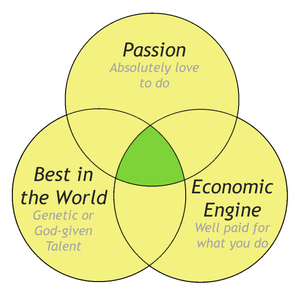Book Review: Good To Great By Jim Collins
 My reading has really suffered of late, and while it’s easy to blame technology and social media, I think lack of discipline has been the reason. Distractions have been there and will always be there, it’s up to us to develop internal discipline and foster habits for success in life.I bought Good To Great about 3 years ago, but it remained unread on my bookshelf till a couple of months ago when we agreed to read it as a team in the office. I regretted not reading it all these years, because it’s a fantastic book.
My reading has really suffered of late, and while it’s easy to blame technology and social media, I think lack of discipline has been the reason. Distractions have been there and will always be there, it’s up to us to develop internal discipline and foster habits for success in life.I bought Good To Great about 3 years ago, but it remained unread on my bookshelf till a couple of months ago when we agreed to read it as a team in the office. I regretted not reading it all these years, because it’s a fantastic book.
Good To Great is based on Jim Collin’s extensive research of 28 Good-to-Great companies; which are companies that showed “good” performance, punctuated by a transition point after which it shifts to “great” performance defined by a total stock return of at least 3 times the general market, for at least 15 years after the transition. In his book, he gives other criteria he used to select these companies. He then compares them with companies in the same industry, that were probably better off at the start, but didn’t make the transition to “great” companies. One of the things I liked about this book is that it’s based on actual research, not theories or the author’s thoughts. They basically started on a blank slate and built conclusions based on research.
In summary, the good-to-great factors
1. It starts with leadership: Jim Collins calls it Level 5 leadership. Typically, we expect great companies to have high-profile leaders with big personalities who make the headlines and become celebrities. Good-to-great leaders seem to be self-effacing, quiet, reserved, even shy, a paradoxical blend of personal humility and professional will. “They are more like Lincoln and Socrates than Patton or Caesar” . Level 5 leaders seem crazy about the company’s success, and will set up their successors for even greater success.
2. First who then what: We tend to think strategy is the starting point to a great business, research has shown it isn’t. A great leader first decides who they want on the bus, then the people on the bus decide where to drive it. Great companies were ruthless with non performers, and great in developing performers. Interesting finding is that good-to-great employees aren’t workaholics but they genuinely loved being at the office, and would sometimes craft their social lives around the company. This goes to affirm that work-life balance isn’t the ultimate dream, work-life integration is. Read this article, about Shao Yano, the youngest person to receive a medical degree from University of Chicago, who is also a noted pianist and a tae-kwo-ndo black belt, and how he’s able to do it.
3. Confront the brutal facts: We are living in an era where it’s very easy to be deceived by the world’s perception of you and your company.It’s easy to buy the hype. Great companies aren’t shy to confront the facts, especially when the facts aren’t so pleasing. They’re most careful when everyone is praising them. They’re also not quick to assign the blame, but will look to thoroughly and honestly analyze the issue before acting. A key learning here, a Level 5 leader is quick to accept his team’s mistakes, and slow to take credit.
4. The Hedgehog concept: This is about self awareness as a company and seeks to answer three questions:
 What can you be the best in the world at (and equally important, what you cannot be the best in the world at)? This is beyond mere competence. Competence is easy to achieve, excellence isn’t.
What can you be the best in the world at (and equally important, what you cannot be the best in the world at)? This is beyond mere competence. Competence is easy to achieve, excellence isn’t.- What drives your economic engine? Businesses exist to make money, you must identify what this is, and if it’s sustainable.
- What are you deeply passionate about?
Great companies’ strategy is around those three circles.
5. Culture of discipline: Good to great companies exist within a culture that combines discipline and an entrepreneurial ethic. For this to be possible, the company must have solid structures, then give it’s employees freedom to act and make decisions within those structures. It flows from disciplined people, to disciplined thought, then disciplined action.
6.Technology accelerators: For great companies, technology isn’t their core success factor, it merely accelerates the process. This probably explains why there are no tech “good-to-great” companies. If technology is your key product and you hope to be great, then you may want to rethink your strategy, because technology changes. Deliver a service/product that isn’t dependent on technology.
I could write so much about this book, it had several great lessons for me, even as I seek to build a company that will outlast me.
Personal application: Get the right people on the bus early, and the wrong people off the bus. As a team leader, I’m usually reluctant to let go of people, even when I’m sure they’re not the right fit for the business. I’m learning to very quickly assess and let go of the wrong people, and how to identify the right people, and not be blinded by impressive credentials at recruitment.
I recommend this book for all entrepreneurs and managers who are looking to build businesses that will outlive them.





5 Comments